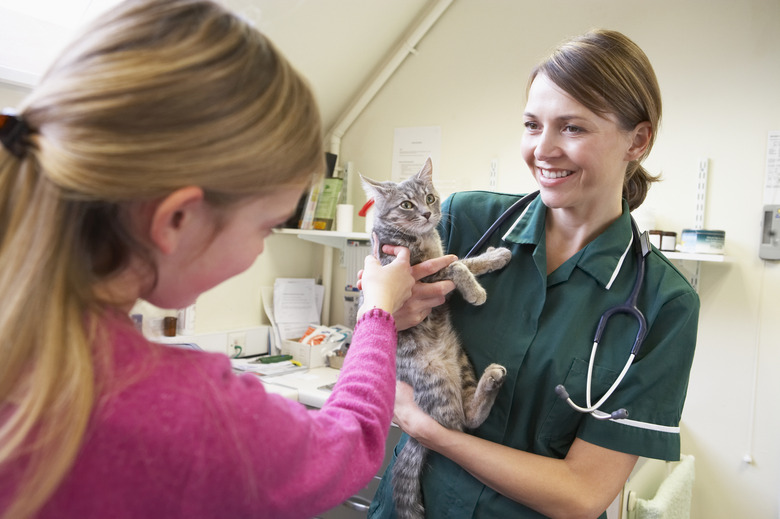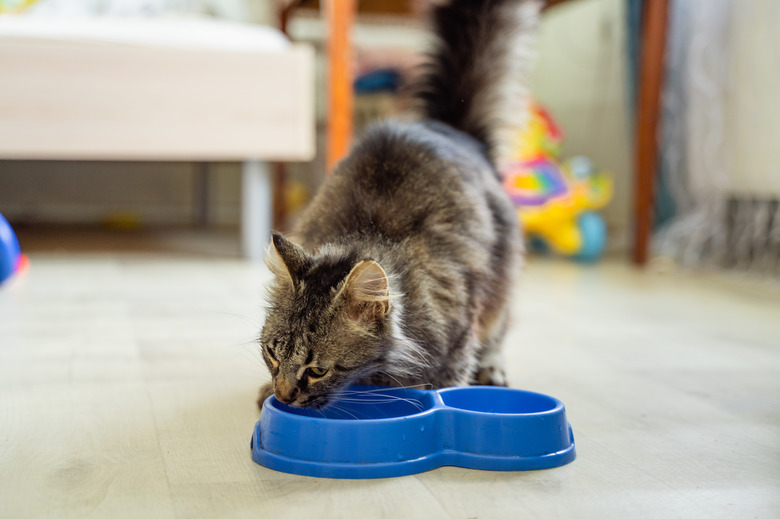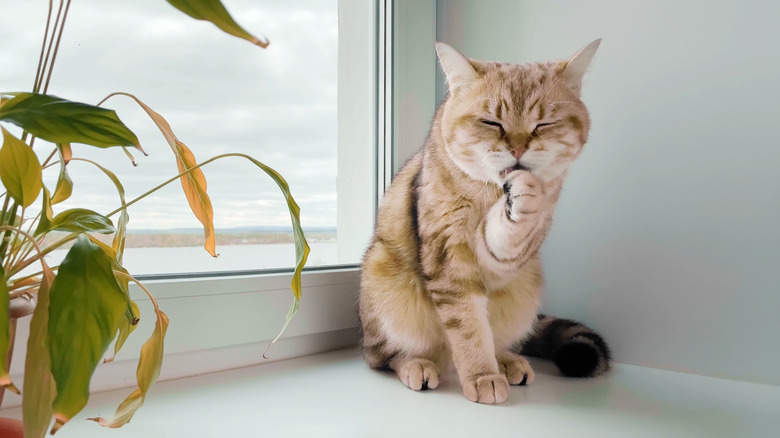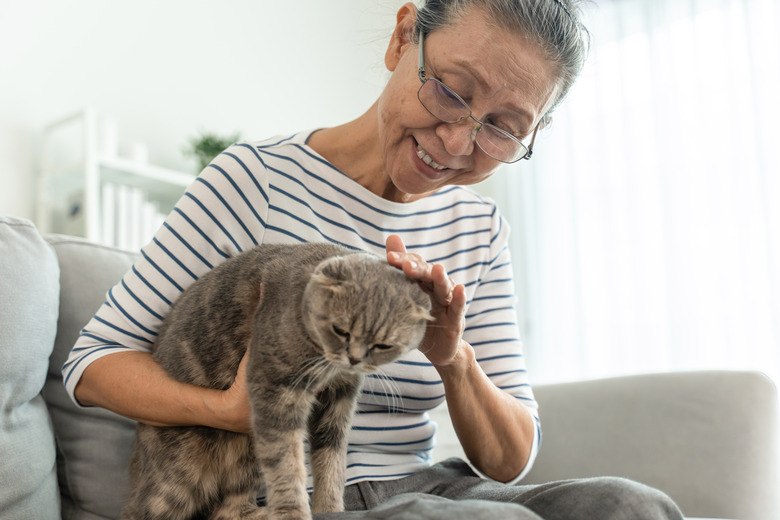Reasons Why A Cat Loses Weight And Hair
Pet owners can have many questions about cat health. You may be wondering, "Why is my cat losing weight?" or "Why does my cat have bald spots?" It can be worrisome, especially if diet and behaviors have not changed. While cat hair loss can be a cause for concern, there are several reasons your cat may be losing hair. For example, it could be due to a common medical condition that your veterinarian can diagnose and treat. More extensive diagnostics may be needed to determine the underlying cause.
Typical causes of hair loss in cats include flea allergy dermatitis; bacterial skin infections; ringworm (a fungal infection); mites, like Demodex or Cheyletiella; or abnormal repetitive behavior. In addition, fur loss combined with weight loss may indicate an underlying metabolic or endocrine disease or cancer. It can also suggest that internal parasites, like roundworms or hookworms, are present. While the information below can provide insight on your cat's hair loss, working with your veterinarian to determine the root cause is essential.
What causes hair loss in cats?
What causes hair loss in cats?
If your cat is experiencing hair loss, there could be many possible causes. In some cases, other symptoms can clue you in, such as frequent itching and scratching. However, you may not always be able to determine the cause of bald patches of a cat's fur on your own. An overall pet health evaluation is required.
Hyperthyroidism in cats
Hyperthyroidism is an oversecretion of thyroid hormone from an abnormal thyroid gland that significantly increases metabolism. Hyperthyroidism, the most common endocrine disease in cats, is why you might say, "My cat is losing weight but eats constantly!" Your veterinarian will first check for hypothyroidism if your cat has a good appetite and otherwise seems normal but keeps losing weight and fur.
You may not even realize your pet is sick because they may behave normally despite the weight loss. However, keep an eye out for increased thirst, restlessness, and begging for food or attention. Other symptoms include vomiting and diarrhea or urinating outside of the litter box. Thankfully, your veterinarian can treat hyperthyroidism with daily medication or radioactive iodine administered to destroy functional thyroid tissue. These treatments cause thyroid hormone levels to decline and symptoms to resolve. After radioactive iodine, some cats may need thyroid hormone supplementation to replace missing hormones.
Cancer in cats
Your cat's combination of weight loss and hair loss could indicate paraneoplastic syndrome. This term refers to a group of disorders that develop when an underlying cancer is present. For example, feline paraneoplastic alopecia is one condition characterized by internal tumors, skin lesions, and hair loss. Hair loss may occur more often in cats with pancreatic, liver, and bile duct cancers or abdominal carcinoma.
Along with feline hair loss, you may notice a decrease in weight, as cancer is a common cause of rapid weight loss in cats. Typically, cancer-related weight loss will also be accompanied by loss of appetite and lethargy.
Hair loss from allergies
Just like humans, your cat can have allergies. Allergies to cat food in particular can be one possible reason behind your cat losing hair and weight. When your cat's body reacts to specific allergens in food, their immune system responds with an inflammatory reaction that can cause itchiness in the skin. Usually, irritation focuses around the head, face, and neck, though other areas can be affected. Just about any component in the food, including beef, fish, chicken, and dairy products, can cause an allergic reaction. Food allergies can develop at any time during a cat's life. Unfortunately, some cats seem genetically predisposed to food allergies.
Suppose your cat experiences year-round itching that results in them pulling out fur and losing weight. In that case, it might be a clue that they suffer from allergies. The itchiness can be so extreme that your cat overgrooms themself, resulting in significant hair loss. Gastrointestinal issues, such as vomiting or diarrhea, can also appear in addition to skin issues, which may lead to weight loss.
Cat hair loss due to fleas or parasites
Cat hair loss due to fleas or parasites
Parasites, such as hookworms or roundworms, can cause gastrointestinal distress, weight loss, and a poor hair coat. Young animals tend to have more severe symptoms.
Roundworms are cats' most common intestinal parasite, affecting up to 75 percent of felines, with even higher rates in kittens. All kittens should undergo a series of deworming treatments. Adult cats are often given monthly preventives or have their stool samples checked regularly for worms. Roundworms live in the cat's intestines and survive by absorbing nutrients from the cat, resulting in weight loss and a dull coat.
Fleas may also lead to hair loss. Some cats are susceptible to fleas and can be allergic to flea saliva left on their skin when the flea bites them. As a result, your cat may be very itchy and may overgroom themself, leading to hair loss. Because fleas can be common, prevention is crucial. Ask your veterinarian about monthly preventative treatments and other preventative treatments. In addition, fleas can be carriers of another parasite called tapeworm.
Adult tapeworms embed themselves in a cat's small intestine and absorb nutrients eaten by the host. Tapeworm infections rarely cause significant disease in cats but can cause weight loss and a poor coat.
Cat hair loss from excessive grooming
Cat hair loss from excessive grooming
Some of these conditions result in excessive grooming. Cats lick themselves frequently but they may overgroom themself if their skin is particularly itchy or irritated. Pain can also cause a cat to overgroom. In rare cases, the condition may be associated with stress. Conditions that can cause overgrooming include fleas, lower urinary tract disease, and feline hyperesthesia.
Excessive grooming can happen anywhere on a cat's body that they can reach with their tongue. However, their belly, the inside of their hind legs, and their front and back flanks are the most common areas where you will notice patches of sparse hair or no hair at all.
If you think your cat's hair loss is due to overgrooming, you'll want to consult your veterinarian to rule out any underlying medical issues.
Alopecia in cats
Alopecia in cats
Cats can have alopecia for a variety of reasons. Alopecia refers to the total or partial loss of hair. It may be due to genetics, known as congenital hair loss, meaning the hair isn't present from birth, or it can be acquired. Acquired alopecia is often from conditions such as fleas or other diseases that impair or destroy your cat's hair follicles. In most cases, inflammatory disorders lead to alopecia in cats, as they cause itching and pain. However, diseases that lead to nutritional deficiencies can also result in a poor coat.
Other symptoms that accompany hair loss in cats
Other symptoms that accompany hair loss in cats
In most cases, your cat may not only experience hair loss but a variety of other symptoms as well. These can include:
- Lethargy
- Loss of appetite
- Frequent itching
- Excessive shedding
- Dry skin
- Sores, redness, or irritation
- Weight loss
Cat hair loss treatment
Cat hair loss treatment
The proper treatment will depend on what is causing your cat's hair loss. Your veterinarian will check your cat thoroughly to diagnose hair loss and determine the cause. They may take samples from your cat's skin or do a culture in addition to a visual exam. This may help them discover fleas, ringworms, or mites. Sometimes, bloodwork or imaging, such as an X-ray, may be necessary to check for cancer, hormonal imbalances, or other diseases. Sampling your cat's blood and performing diagnostic imaging can be particularly useful if your cat is also losing weight.
After your veterinarian discovers the source of your cat's hair loss, they will be able to work with you to treat your cat and get them feeling better.
The bottom line
The bottom line
Cat owners should know that there are numerous reasons a cat may be losing hair and weight, such as hyperthyroidism, cancer, allergies, fleas, parasites, excessive grooming, or congenital or acquired alopecia. Treatment for your cat's hair and weight loss will depend on the cause, and may include diet changes, medications, surgery and radiation or chemotherapy, and in the case of fleas, ongoing monthly prevention. Consult your pet's DVM for a diagnosis and treatment.



